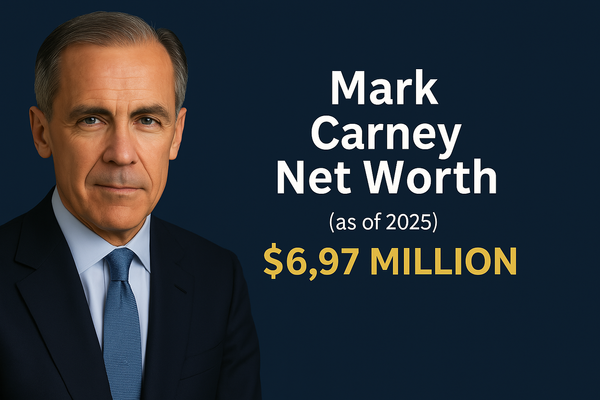Mark Carney's Book Reveals: The Hidden Story Behind Canada's Economic Success
Mark Carney makes a startling revelation in his book - the world needs $3.5 trillion to $5 trillion in yearly investments to achieve global climate goals. His work "Value(s): Building a Better World for All" delves deep into the intricate connection between market value and human values.
The book's scope extends well beyond economics. Carney outlines seven core values that shape modern economics: dynamism, resilience, sustainability, fairness, responsibility, solidarity, and humility. His track record speaks volumes. Canada's successful navigation through the 2008 financial crisis happened under his watch. Later, at the Bank of England, he introduced groundbreaking policies, including his signature "forward guidance" approach. His creation, the Glasgow Financial Alliance for Net Zero, now oversees $70 trillion in assets and shows his dedication to merging economic success with environmental stewardship.
This analysis will show how Carney's insights, drawn from his rich background in private and public sectors, create a roadmap toward a more sustainable and fair economic future.
From Goldman Sachs to Global Central Banking
Mark Carney's trip from investment banking to becoming one of the world's most influential central bankers shows an unusual path that shaped his unique economic philosophy. His book "Value(s)" shows his rich experience in private and public sectors - a rare combination in economic leadership.
Early career and formative influences
Harvard University laid the foundation of Carney's academic journey with a Bachelor of Arts in Economics in 1988. A short stint at Goldman Sachs followed. He then went to Oxford University and completed his master's degree and doctorate in economics by 1995.
His elite education and early exposure to global finance gave him an unmatched viewpoint. His Oxford doctoral thesis showed early signs of his economic thinking. He argued that successful international corporations emerge from intense business competition rather than government industrial promotion policies. This belief later shaped how he approached regulation and economic management.
Key lessons from private sector experience
Carney spent 13 remarkable years at Goldman Sachs. He worked in Boston, London, New York, Tokyo, and Toronto. He climbed the corporate ladder fast and became Managing Director for Investment Banking in Toronto by 2002.
His Goldman years exposed him to major economic events of the late 20th century. Carney:
- Worked on South Africa's post-apartheid venture into international bond markets
- Helped shape Goldman's response to the 1998 Russian financial crisis
- Led the sovereign risk management division as co-head
These lessons became valuable assets during his central banking career. A colleague said: "Not much says global financial elite more than Goldman Sachs. Not much more says success in that field, either".
Transition to public service
August 2003 marked a surprising turn. Carney left his profitable path to Goldman Sachs partnership and became a deputy governor at the Bank of Canada. The financial world was shocked as most expected him to become a Goldman partner.
Just 13 months later, he moved to become senior associate deputy minister in the Department of Finance. He represented Canada at G7 meetings and managed big government projects, including the sale of government's stake in Petro-Canada.
His success caught attention quickly. He had chances to become deputy minister in two government departments. Instead, Carney went back to the Bank of Canada in November 2007 as Advisor to the Governor. A month earlier, he had been picked for the top job - a quick rise that put him in position to guide Canada through the coming global financial crisis.
Over the last several years in public service, Carney managed to keep his unique background as an asset. His early speeches as governor showed support for globalization while noting its challenges: "It is incontestable that the current wave of globalization has been, on balance, of great benefit".
This unique mix of academic excellence, private sector know-how, and public service dedication shapes the main themes in his book "Value(s)" and his approach to finding balance between market forces and human needs.
Navigating the 2008 Financial Crisis
"I led global reforms to fix the faultlines that caused the financial crisis, worked to heal the malignant culture at the heart of financial capitalism and began to address both the fundamental challenges of the fourth industrial revolution and the existential risks from climate change." — Mark Carney, Former Governor of the Bank of England and Bank of Canada
The 2008 global financial crisis rocked economies worldwide. Canada stood strong and came out better than other G7 nations. This wasn't just good fortune. Strategic leadership, smart regulations, and quick action made all the difference—ideas that would later shape Mark Carney's economic thinking in his book "Value(s)."
Canada's resilient banking system
Canadian banks showed exceptional stability during the 2008 meltdown. Not a single financial institution failed or needed government help. The secret lay in Canada's unique setup: unlike America's scattered system, just six Canadian banks held 93% of the market.
This rock-solid foundation took years to build. Canadian banks tackled potential bank runs without needing central bank help. Back in the 19th century, Canadian and American banking systems went separate ways. Canada built a strong, single-regulator system that took on key economic risks like mortgage and investment banking.
Canadian banks kept their debt-to-equity ratios lower than their international peers. They had to keep extra capital well above what regulations required. Less than 3% of Canadian mortgages fell into the subprime category before the crisis hit. The US had it much worse at 15%.
Carney's crisis management approach
Carney stepped in as Bank of Canada Governor in February 2008. He quickly cut interest rates by 50 basis points in March 2008, just weeks into his new role. This bold move kicked off his strategic response to the growing crisis.
Markets kept getting worse. Carney set up new emergency loan options and launched three fresh ways for banks to keep running normally. His biggest move? A new "conditional commitment"—he told everyone exactly how long interest rates would stay at record lows.
"We understand the severity of the situation, and we are taking action to address it," Carney said at a press conference. He stressed how important it was for countries to work together during the crisis. His steady, confident way of talking helped people trust Canada's financial system.
Policy innovations that protected Canada
Carney didn't stop at basic money policies. His team worked with the government on Canada's Economic Action Plan to boost the economy right away. The package pumped CAD 62.70 billion from federal sources and about CAD 87.78 billion when you count what provinces chipped in.
Smart new policies included:
- The Term Loan Facility let banks get cash at very low rates
- The Insured Mortgage Purchase Program let the government buy up to CAD 174.17 billion in mortgages from banks
- Strategic rate cuts brought the policy rate down to 0.25% by April 2009
Canada didn't need to print money like the US and UK did. The focus stayed on making the financial system stronger through special liquidity measures and targeted help programs.
The numbers told the story. Canada became the only G7 country to get back all jobs and output lost in the recession. The country kept the lowest debt-to-GDP ratio in the G7. It was the only member to fully bounce back from lost business investment during the crisis.
These experiences left their mark on Carney's economic thinking. He later expressed these ideas in his book "Value(s)," especially about finding the sweet spot between market success and long-term stability—a theme that runs deep in his economic philosophy.
The Bank of England Years: Expanding Economic Vision
Carney stepped into a much bigger spotlight with his 2013 appointment as Bank of England Governor. His experiences there ended up shaping the economic philosophy he later detailed in his book "Value(s)." The role challenged him with deregulation aftermath, Brexit uncertainty, and a growing climate crisis until 2020.
Brexit challenges and responses
"The possibility of a no deal is uncomfortably high at this point," Carney warned in a 2018 BBC interview. His statement sent sterling to an 11-day low against the dollar. Pro-Brexit politicians criticized his warnings about Brexit risks. They accused him of going beyond his apolitical role and participating in "Project Fear".
The Brexit referendum passed in 2016, and Carney's leadership proved vital. He faced what he called his "toughest day" on the job as he addressed the nation after David Cameron resigned and the pound dropped sharply. The Bank's contingency plans worked well. They cut interest rates from 0.5% to 0.25% and restarted quantitative easing to support the economy.
Climate finance initiatives
Carney tackled what he saw as our era's third major crisis—climate change—during his time at the Bank of England. Climate risks became a cornerstone of his economic vision. He helped create the Taskforce on Climate-related Financial Disclosures in 2015, which later formed the foundations for mandatory climate disclosure standards.
Carney took on the role of UN Special Envoy for Climate Action and Finance after leaving the Bank in 2020. He then launched the Glasgow Financial Alliance for Net Zero, bringing together more than 160 financial institutions that managed trillions in assets. "What we have now in private finance is a focus on a clear goal – net zero – and finding the opportunities to advance that and to be rewarded by it," he stated.
Rise of his values-based thinking
Carney transformed from a traditional central banker into a vocal critic of "market fundamentalism"—the belief that markets cannot be changed and are always right. His book "Value(s)" suggests that society's embrace of subjective market valuations has stripped away its power to express what matters most.
Carney's thinking now emphasizes the connection between stakeholder value and purposeful companies. "Being carbon- and climate-competitive is going to be an increasingly important determinant of shareholder and stakeholder value," he noted. His seven core values—dynamism, resilience, sustainability, fairness, responsibility, solidarity, and humility—show this shift toward an economics that balances profit with purpose.
Inside 'Value(s)': Key Themes and Insights
"Putting a price on every human activity erodes certain moral and civic goods. It is a moral question how far we should take mutually advantageous exchanges for efficiency gains." — Mark Carney, Former Governor of the Bank of England and Bank of Canada
Mark Carney's "Value(s): Building a Better World for All" reveals a striking contrast. His analysis shows how our economic systems have slowly blurred the difference between price and worth.
The tension between market value and human values
Carney stands against an economy where "the price of everything is becoming the value of everything". This key idea is about how market fundamentalism has turned our market economy into a "market society". His book shows how subjective market valuations have taken away society's power to express what really matters.
Simple examples make this difference clear. A garbage collector makes much less than a professional athlete, yet their value to society is completely different. This mismatch points to a deeper issue - financial metrics now overshadow basic human needs and social bonds.
Seven core principles for economic success
Carney highlights seven essential values that are the foundations of a thriving economy:
- Dynamism that channels human creativity
- Resilience that protects vulnerable people during tough times
- Sustainability that looks at long-term effects across generations
- Fairness in markets that keeps them legitimate
- Responsibility that makes people accountable
- Solidarity where citizens recognize their duties to each other
- Humility that acknowledges limits of knowledge
These principles shape what Carney calls "mission-oriented capitalism". This vision matches current business trends where companies create shareholder returns while tackling society's challenges.
Critique of market fundamentalism
Carney strongly condemns "market fundamentalism" - the belief that markets never fail and shouldn't change. He made his point clear: "unchecked market fundamentalism can devour the social capital essential for the long-term dynamism of capitalism itself".
His criticism targets what he calls the "three lies of finance": that this time is different, markets are transparent, and markets are moral. These false beliefs led straight to financial crises and weakened social bonds.
Carney supports "purposeful capitalism" where businesses balance everyone's interests instead of just focusing on shareholder profits. He believes that "being carbon- and climate-competitive is going to be an increasingly important determinant of shareholder and stakeholder value".
How Carney's Ideas Shaped Canadian Economic Policy
Canada's economic stability shows how policies align with principles from Carney's book "Value(s)." His impact on Canadian economic policy built frameworks that still shape the nation's financial world today.
Regulatory frameworks that encouraged stability
Canada has the lowest net debt-to-GDP ratio among G7 countries. We achieved this through careful economic management. The world recognizes Canada's regulatory system as one of the best globally. The Cabinet Directive on Regulation guides this system to promote state-of-the-art solutions while protecting public welfare.
These regulatory safeguards helped Canada become the only G7 country to recover all jobs and output lost during the 2008 crisis. But today's regulatory system faces new challenges. Canada now has 44 distinct financial services regulators. This complex framework can slow down growth.
Building economic resilience through diversity
Carney saw economic diversity as the life-blood of stability. He stated, "Diversity with respect to our nation's industrial structure... is important because sectoral diversity makes the economy more resilient—although not immune—to shocks".
The numbers back this up. More than 70% of industries have grown—a rate not seen since the oil price shock. This broader range of growth sources has spread employment gains across regions, creating a more balanced economy.
Long-term vision versus short-term gains
Carney's book "Value(s)" challenges short-term thinking. Canadian policy now aims to "accelerate productivity growth" and keep Canada "a competitive place to do business". Unlike market fundamentalism, these policies show how growth-minded approaches can lift all parts of society without trade-offs.
Canadian economic policy reflects Carney's vision of finding balance between market and human values. The government focuses on "expanding the capacity of the Canadian economy to create new opportunities today and for the next generation". This approach recognizes that economic systems should build long-term human prosperity rather than chase quick gains.
Conclusion
Mark Carney's incredible experience in global finance teaches us valuable lessons about finding the right balance between market forces and human values. His career path from Goldman Sachs to central banking leadership showed how sound economic management could protect nations during crises and build stronger foundations for the future.
His book "Value(s)" shows a better alternative to market fundamentalism. Carney promotes an economic system based on seven most important values - dynamism, resilience, sustainability, fairness, responsibility, solidarity, and humility. These principles helped him lead successfully during the 2008 financial crisis and tackle challenges at the Bank of England.
Canadian economic policy today still follows many of Carney's core principles. The combination of strong regulations, diverse economy, and future-focused planning keeps Canada as a leader among G7 nations. His greatest achievement might be showing how economic systems can deliver both market efficiency and human prosperity together.
Carney's vision of purposeful capitalism gives us a clear path to tackle modern challenges like climate change while keeping the economy stable. His wisdom reminds us that true economic value goes way beyond the reach and influence of market prices and includes the basic values that create better societies for everyone.
FAQs
Q1. What is Mark Carney's background in finance and economics? Mark Carney has a diverse background, including a 13-year career at Goldman Sachs, followed by roles at the Bank of Canada and the Bank of England. He holds degrees in economics from Harvard and Oxford universities.
Q2. How did Canada's banking system perform during the 2008 financial crisis? Canada's banking system demonstrated exceptional stability during the 2008 crisis, with no financial institutions failing or requiring government bailouts. This was due to prudent regulations and a concentrated banking model.
Q3. What are the key themes in Mark Carney's book "Value(s)"? The book explores the tension between market value and human values, critiques market fundamentalism, and proposes seven core principles for economic success: dynamism, resilience, sustainability, fairness, responsibility, solidarity, and humility.
Q4. How has Mark Carney addressed climate change in his economic approach? Carney has been a strong advocate for addressing climate risks in finance. He helped launch the Taskforce on Climate-related Financial Disclosures and later became the UN Special Envoy for Climate Action and Finance.
Q5. What is Mark Carney's vision for the future of capitalism? Carney advocates for "purposeful capitalism" where companies balance stakeholder interests rather than focusing exclusively on shareholder returns. He believes businesses should aim to solve societal problems while generating profits.


